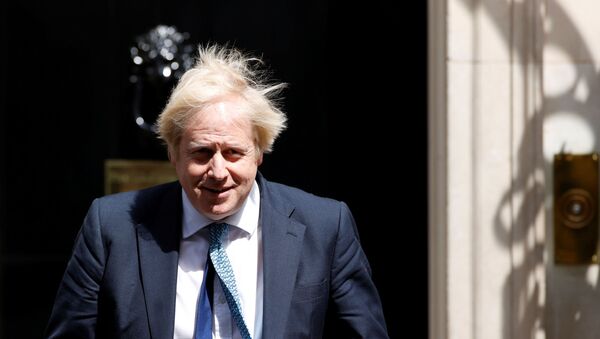British Prime Minister Boris Johnson has urged Britons to "move on" from the scandal simmering around his chief adviser Dominic Cummings who drove his family 260 miles from London to northern England in late March when his wife developed COVID-19 symptoms in defiance of the government's lockdown rules he advocated so vigorously.
"I am not certain right now an inquiry into that matter is a very good use of official time," Johnson told British lawmakers following the public outburst and calls for Cummings' resignation.
How Johnson's Effort to Shield Cummings Backfires
"Point one is that public opinion disagrees with the prime minister about the legitimacy of Cummings actions and opinion polling suggest that between 70 and 80% think that Dominic Cummings did break the rules. Also the majority think he should go", elaborates John Curtice, professor of politics at the University of Strathclyde, Glasgow.
What's particularly difficult for Johnson is that this mood is widespread not only among the opposition electorate but also among the Conservative Party voters, who, according to a poll, are fifty-fifty on whether Cummings should resign, the professor underscores.
Meanwhile, new YouGov poll for The Times of London newspaper has indicated that support for the Tories slumped by four points, to 44% over the recent row, while Labour got additional five points within a single week.
On 27 May, over 40 Tory lawmakers called upon Cummings to step down. However, Johnson's chief adviser provided a detailed explanation of his actions in an official statement and made it clear that he would not resign over the trip in question.
NEW: Durham Police statement says Dominic Cummings *did* break lockdown rules during his stay in Durham. pic.twitter.com/OSMXLrjDj4
— Pippa Crerar (@PippaCrerar) May 28, 2020
"The risk number one he faces is the risk of damaging the reputation of the government and eroding some of the governor's political support", Curtice underscores. "The second problem he faces in the wake of this is that there is a serious level of discontent within the Conservative Party".
According to the professor, Boris Johnson’s authority largely rests on the fact that he has delivered Brexit and got an 80-seat majority; but this authority could be eroded quite quickly if conservative lawmakers conclude that he is inflicting damage to the party's interests by his decision.
Besides this, by continuing to defend Cummings' action the government is throwing into question its own quarantine policy and risks "becoming a point of ridicule" on social media, Curtice warns.
"Johnson’s position on the Cummings affair has already further tarnished Johnson’s image", echoes Alan Bailey, a UK-based political commentator.
While initially Johnson's actions met Britons expectations that the nation is pulling together to confront the virus and even sympathy, when the prime minister apparently contracted the virus himself, now "the message of ‘We’re in it together’ which was broadcast to the whole UK population has been shown to be a farce", Bailey notes.
"The public have one set of rules laid out to us and those with seemingly immoveable power can do as they wish", he underscores.
Why Johnson Takes a Risk of Defending Cummings
One might ask as to why Johnson is defending Cummings though the latter broke the rules thus damaging the party's reputation.
"The number one thing is when the story originally broke, which of course broke in papers that support the opposition and in papers that support the EU, there is a feeling that this is an opposition supporting media promoting a dubious story", Curtice suggests. "[Boris Johnson] probably believed the story would die down faster than it has and not undermine the government's credibility".
On the other hand, the prime minister apparently needs Cummings, who is largely regarded as "highly effective but extremely abrasive", the professor presumes: "Boris is not a details person so he probably things he needs someone like Cummings who can change things and change them in a very radical way", he says.
For his part, Bailey notes that while rumours are floating around that Cummings is "untouchable", a more realistic version is that until recently "Cummings [has been an] unseen architect of Johnson’s government and his loss would be a severe blow to Johnson’s premiership".
The questions whether Johnson's chief adviser will step down still remains open. According to Bailey, it depends on the numbers of Conservative MP’s who join the fray in requesting Cummings to stand-down.
If significant members of the Conservative’s begin to shout for Cummings to go then things could change", the political commentator suggests. "However since Cummings and Johnson are standing firm until now they are obviously very determined to ride this out".


